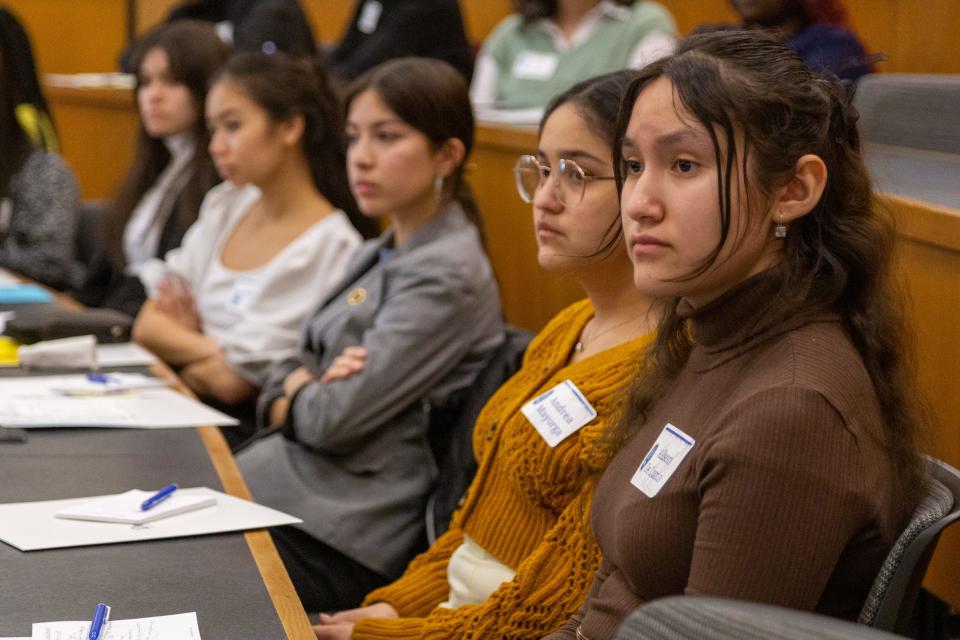At Color of Justice event, students of color explore careers in law
Roosevelt High School students Ealaf Adam, Dairen Castro and Angelina Dang each grew up watching members of their families go through the legal process.
They saw loved ones face language barriers and struggle to understand the law, find lawyers or fill out legal documents. Adam, 18, recalled attending immigration court hearings for her mother, a Sudanese refugee, while 16-year-old Dang said she interpreted legal advice for her parents, translating "big words" she didn't even know from English to Vietnamese.
But an event on Tuesday at Drake University helped the three teens open their eyes — that maybe their personal experience could lead to a potential career in law.
Adam, Castro and Dang were among 30 students of color from Des Moines Public Schools invited to tour the university's law school and legal clinic and hear from alumni and current law students about their journeys into the legal profession. Called the Color of Justice, the nearly daylong event was sponsored by the university and the National Association of Women Judges, with funding provided by the Iowa Bar Association and the Central Academy Alumni Network.
District Judge Celene Gogerty and District Associate Judge Romonda Belcher, both of whom graduated from Drake, helped lead the event and moderate panel discussions.

Belcher, who made history by becoming Iowa's first Black female judge, said the Color of Justice is an opportunity for young people to see individuals who look like them pursuing degrees or careers in various fields of law.
People of color are widely underrepresented in the legal profession, the American Bar Association (ABA) reported. In 2020, only 5% of lawyers were Black — a percentage that has remained the same for nearly a decade — and about 5% were Hispanic, according to the ABA. While 40% of the U.S. population are people of color, 18% of state high court justices are Black, Latino, Asian American, Native American or multiracial, the Brennan Center for Justice recently reported.
More:Iowa has the only all-male supreme court in the country. Could that change this year?
"This event really showed like these people are you and you are them," said Adam, a senior at Roosevelt, who sat behind Belcher during the lunch portion of the event. "That you can be in their spot and you can inspire others to do the same. It's really important that we get to actually see people who have similar experiences to us and are actually in law."
Dang, a sophomore at Roosevelt, told the Des Moines Register she enjoyed listening to guest speakers and learning that their path to studying law wasn't "smooth."
Take for instance Gloria Soto, a third-year law student who once worked in special education before making a career pivot and applying for law school. Or Carlos Lopez, another third-year law student, who wasn't sure what to do with his undergraduate degree in public administration and law enforcement management. Law student Michael Sharp said he went into undergrad with an undeclared major, and classmate Dariann Garrison-Nickerson said she was mainly focused on playing college ball.
In a panel discussion, they spoke about pursuing law, navigating the college application process and handling the stress and demands of law school. Some opened up about being first-generation college students in higher education and overcoming the challenges to find resources, mentors and job opportunities.
Lopez, 28, told the teens that he was an average student and a two-sport athlete in high school and helped his mother keep the books to her business. He had decent grades even in college and "didn't really have a career planned out." He went with the flow.
Lopez said the lesson there is to just try. You have to "motivate yourself" and be willing to go to those lengths when you find something you're passionate about.
Echoing Lopez, Belcher said she shared this advice with participating students.
"Don't let anybody tell you you're not smart enough," she told the Register. "(That) you aren't the right race. You don't have the education, you don't have enough experience. If you lack something, go get that thing so you can prepare yourself for the opportunity when it presents itself to you."
F. Amanda Tugade covers social justice issues for the Des Moines Register. Email her at ftugade@dmreg.com or follow her on Twitter @writefelissa.
This article originally appeared on Des Moines Register: At Color of Justice event, students of color explore careers in law

